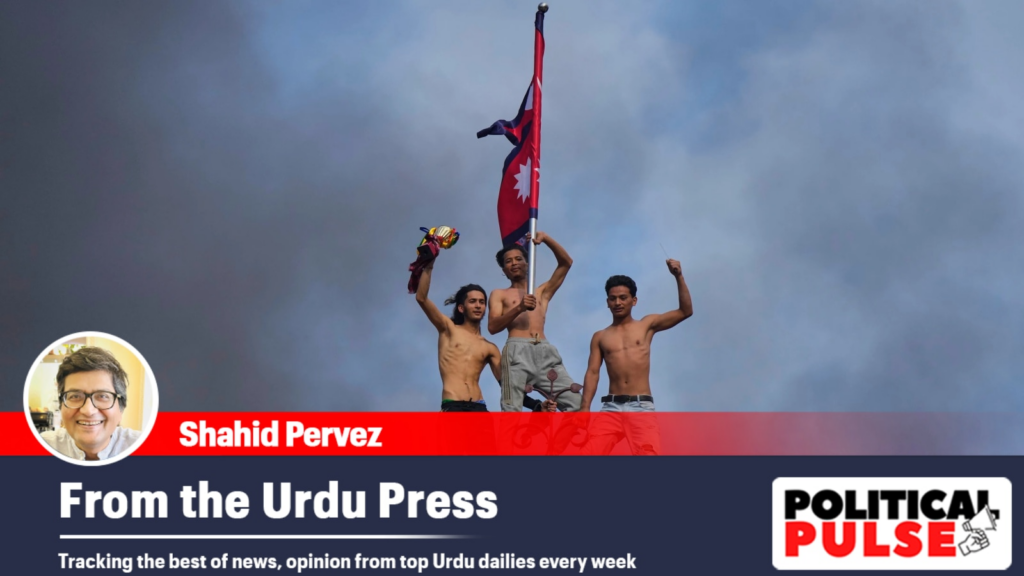In a week dominated by big news stories, the Urdu dailies kept their focus on the Nepal power shift, triggered by Gen Z protesters agitating against a social media ban, nepotism and corruption, as well as on Prime Minister Narendra Modi ‘s first visit to Manipur 28 months after the onset of ethnic strife in the Northeastern state. The Supreme Court’s interim ruling over the amended Waqf law was seen as a mixed bag by all stakeholders.
Commenting on the Supreme Court’s interim ruling on the Waqf Amendment Act, 2025, the Hyderabad-based Munsif, in its September 16 leader, points out that while the apex court has stayed certain contentious provisions of the Act, it has held that no case was made out to stay the entire statute. The editorial notes that the Bench of Chief Justice B R Gavai and Justice A G Masih said there is always a presumption in favour of the constitutionality of a law passed by Parliament and that it is only stayed in the rarest of rare cases. The interim stay on select provisions of the Act will exist until the Supreme Court can make a final determination on its constitutionality.
The editorial says the apex court stayed the power the new law granted to a district collector in determining the status of a Waqf property, finding it violative of the doctrine of separation of powers, as well as put on hold the provision of a five-year period condition of practising Islam for creating a Waqf, which would be subject to the government framing rules regarding it. The top court also capped the number of non-Muslims who could be appointed to the Central Waqf Council and state Waqf boards, observing that the head of a Waqf board should be from the Muslim community as far as possible, the edit states.
Overall, the apex court’s order gave only partial relief to the Muslim community, says the daily. “The community should however not lose heart since this is not the final verdict,” it says, adding that the petitioners should double down on their legal fight till the end. “At the political level too, they should continue their struggle against the amended Waqf law, putting pressure on non-NDA governments in states to resist it.”
URDU TIMES
Highlighting the political upheaval in Nepal in the wake of Gen Z protests against corruption and the now-revoked ban on multiple social media platforms, which toppled the K P Sharma Oli-led government, the Mumbai-based Urdu Times, in its September 13 editorial, writes that when youths take to the streets, their movement shakes up a government. It says that such protests have led to the ouster of governments in recent years in two other neighbouring countries, Bangladesh and Sri Lanka, whose heads were not only forced to step down but had to even flee their countries. In Nepal, the edit says, after days of youth protests, curfew, violence and arson, the political vacuum has come to an end with former Supreme Court Chief Justice Sushila Karki being sworn in as the interim Prime Minister.
The daily notes that Karki has been chosen by the youth protesters, and the move was facilitated by the Nepal Army chief. “The dramatic developments in Nepal have again underlined the power of youths. There had been a massive clampdown by the Nepalese security forces on young protesters, resulting in scores of deaths, but it could not suppress them. They were angry and motivated,” it says.
There seem to be lessons for our country as well even though the situation in India is different, the editorial says. “It is the government’s responsibility to be responsive to the concerns and demands of people. It should not turn its back on them.”
INQUILAB
Terming PM Modi’s visit to Manipur as a “significant development”, the New Delhi edition of Inquilab, in its September 14 editorial, notes that it was his first visit to the state since the eruption of the ethnic conflict between Meitei and Kuki-Zo groups in May 2023, which has so far killed hundreds of people and displaced thousands of families. Before addressing the gatherings in Churachandpur and Imphal, the PM met some displaced people and, during his trip, announced development projects worth thousands of crores, the edit says. “The PM said he and his government are with the Manipur people. It was a message of new hope and renewal. But the key question is, could mere development projects heal Manipur’s wounds?”
The daily writes that there is a deepening divide coupled with a trust deficit between the Kuki-Zo-inhabited hills and Meitei-dominated Valley. “The Opposition has criticised Modi’s Manipur trip for having come too late. If the PM had visited the state at the outset, it might have made a difference. Beyond the development package, there does not seem to have been any concrete move to bring the two sides together,” it says. “The differences between the minority Kuki-Zo and the majority Meitei communities cannot be resolved only through the push for infrastructure and investment. It needs a political process and dialogue based on equality and justice.”
The editorial also notes that the PM appealed for peace. “However, Modi’s visit would have made a historic breakthrough if it had kickstarted the process of a dialogue between Kuki-Zos and Meiteis,” it says, adding that the onus for restoring lasting peace and normalcy in Manipur is squarely on the Centre as the state has been under the President’s Rule for months. “The PM said India’s culture is incomplete without Manipur’s culture. His visit is certainly a ray of hope. But, only pledges and speeches are not enough — it is time to translate words into action as Manipur stands at a critical crossroads now.”

